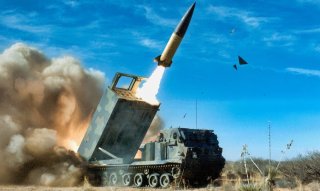America Has No Idea What a Ukraine 'Victory' over Russia Looks Like
That the United States is unable to articulate exactly what a Ukraine victory against Russia should look like suggests the Washington has no idea.
Having just passed a $95-billion aid package, much of which will be sent to Ukraine, one might expect the United States to have clearly defined what victory in Ukraine looks like.
But collectively, the United States has been vague about what constitutes a win in the Russia-Ukraine war.
A return to Ukraine’s pre-2014 borders? Prolonged exhaustion of Russian resources? The collapse of Vladimir Putin’s regime?
Unclear. Most of the official rhetoric surrounding U.S. support for Ukraine makes a platitudinal appeal to stand up for democracy and against tyranny.
Despite the eleven-figure infusion of American cash, the Ukrainians are likely incapable of achieving a traditional military victory against the Russians. Rather, the American aid likely serves only to prolong the conflict. Maybe that’s the point.
Bait and Bleed Russia in Ukraine?
Maybe the point isn’t to facilitate a Ukrainian victory. Maybe the point is to exsanguinate Russia. John Mearsheimer, in his seminal text, The Tragedy of Great Power Politics, discusses the idea that a nation may bait an adversary into a conflict, and prolong the conflict, so that the adversary is drained of resources, hence weakening that nation’s position. Mearsheimer called the move “Bait and Bleed.” Is the United States purposefully baiting and bleeding Russia, prolonging the Russia-Ukraine war for the purpose of exhausting Russian resources?
Possibly. Russia’s predecessor, the Soviet Union, exhausted itself to the point of regime collapse in part because of its invasion and occupation of Afghanistan. The Americans, through the CIA, helped facilitate the Afghan resistance, prolonging the Soviet struggle, namely through giving cash and weapons to the Taliban. Perhaps the United States is drawing inspiration from the Soviet-Afghanistan analogy when approaching the Russia-Ukraine crisis.
Does it matter?
Perhaps one of the reasons the United States is struggling to articulate a vision for victory in Ukraine is because a victory in Ukraine means so little to U.S. interests. Rhetoric about standing up for democracy aside, the United States gains little, if anything, from the outcome of the Russia-Ukraine war. Certainly, the United States has an interest in preventing Russian hegemony in Europe, but a Russian victory in Ukraine is unlikely to pave the path toward Russian continental dominance.
Three years into the conflict, with little progress made, Russia has proven itself incapable of making meaningful territorial gains. If Russia cannot conquer Ukraine, a weak and immediate neighbor, Russia would likely struggle to make more ambitious gains, say, where German, French, or British interests were threatened.
The fact that Europe’s leading powers—the German, French, and British—have failed to mobilize a full-throated defense of Ukraine belies a lack of urgency that the Americans should heed. Said another way, if Germany doesn’t care about Russian advancement in Ukraine, then the United States should not care either—which is not a “let Europe defend Europe argument” but rather an appeal to Europeans’ own ability to correctly gauge when they are under threat or not. Right now, Europe is not behaving as if it is under threat. America should honor that assessment.
Because U.S. interests are divorced from the Russia-Ukraine war’s outcome, continued investment in the conflict is essentially money wasted. And that the United States is unable to articulate exactly what a Ukraine victory should look like suggests the United States has no idea.
About the Author: Harrison Kass
Harrison Kass is a defense and national security writer with over 1,000 total pieces on issues involving global affairs. An attorney, pilot, guitarist, and minor pro hockey player, Harrison joined the US Air Force as a Pilot Trainee but was medically discharged. Harrison holds a BA from Lake Forest College, a JD from the University of Oregon, and an MA from New York University. Harrison listens to Dokken.


